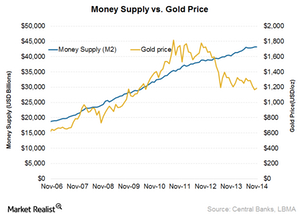Global money supply and its link to gold
The gold price increase kept pace with the global money supply until recently. The relationship between the two appears to have broken.
Nov. 19 2019, Updated 5:16 p.m. ET

What is money supply?
Money supply is the total amount of currency and other liquid instruments in circulation in an economy. M0, M1, M2, and M3 are defined according to the type and size of the account in which the instrument is kept. M0 and M1 are called narrow money. They include coins and notes in circulation. M2 includes M1. M3 includes M2. M3 is the broadest measure of money. Meanwhile, definitions vary from country to country. A country’s central bank usually collects and publishes money supply data.
Money supply and gold
The money supply can grow as a byproduct of economic growth. When money supply growth is used to prop up a financial and economic system instead of to fuel strong economic growth, the price of gold is likely to climb.
This is what happens when money supply in the system increases without any corresponding increase in the supply of goods. It leads to inflationary pressures because more money chases the same amount of goods and services. It also leads to currency debasement. As we discussed previously in this series, weakness in the US dollar and inflation lead to more demand for gold. So, gold has a positive relationship to money supply.
Global money supply
As a proxy for global money supply, we’ve taken the money supply of the United States, Europe—the Eurozone and the United Kingdom—Japan, India, China, Russia, Brazil, and Turkey. The money supply used is M2. It’s expressed in US dollars for each country at prevailing exchange rates. In the above chart, you can see that the pace of money supply stabilized in recent months. November’s level was similar to October’s, at $43.18 trillion.
Global money supply has been increasing rapidly. The gold price increase kept pace with the global money supply until recently. The relationship between the price of gold and global money supply appears to have broken.
Take a broader view
There are other factors that are probably more important. They put downward or upward pressure on prices. One example is the European Central Bank, or ECB, quantitative easing announcement. This resulted in inflows to gold-backed ETFs such as the SPDR Gold Trust (GLD).
But the impact of money supply on gold prices gives only a partial view. It’s important to look at other factors to get a complete picture of what impacts gold prices and gold stocks such as AngloGold Ashanti (AU), Barrick Gold (ABX), Newmont Mining (NEM), Kinross Gold (KGC), and ETFs that invest in the above stocks such as the VanEck Vectors Gold Miners ETF (GDX). These companies combined constitute 29.7% of GDX’s net assets.
